November 29, 2023
Project management comes with a steep learning curve. Making the transition from just being responsible for your own work to managing the work of others requires a set of skills and knowledge you may feel you don’t have yet. How do you get projects done on time and on budget? What qualities make up a successful team? How do you work with different personalities, especially when challenges arise? How do you become a trusted advisor to clients? If you’re in the midst of this transition and feeling the incline of that learning curve, you’re not alone—in fact, you may be right where you’re supposed to be.
Pushing Through the Dip
Learning a new skill typically gets harder before it gets easier. Too often, people quit in “the dip” when they’re close to climbing out of it. Coined by Seth Godin, author of The Dip: A Little Book That Teaches You When to Quit (and When to Stick), the dip refers to the stage where things get challenging; you might feel that you’re not making any progress at all, or even going backwards. When you can discern that you’re in a dip and not a dead end, the results come when you push through.
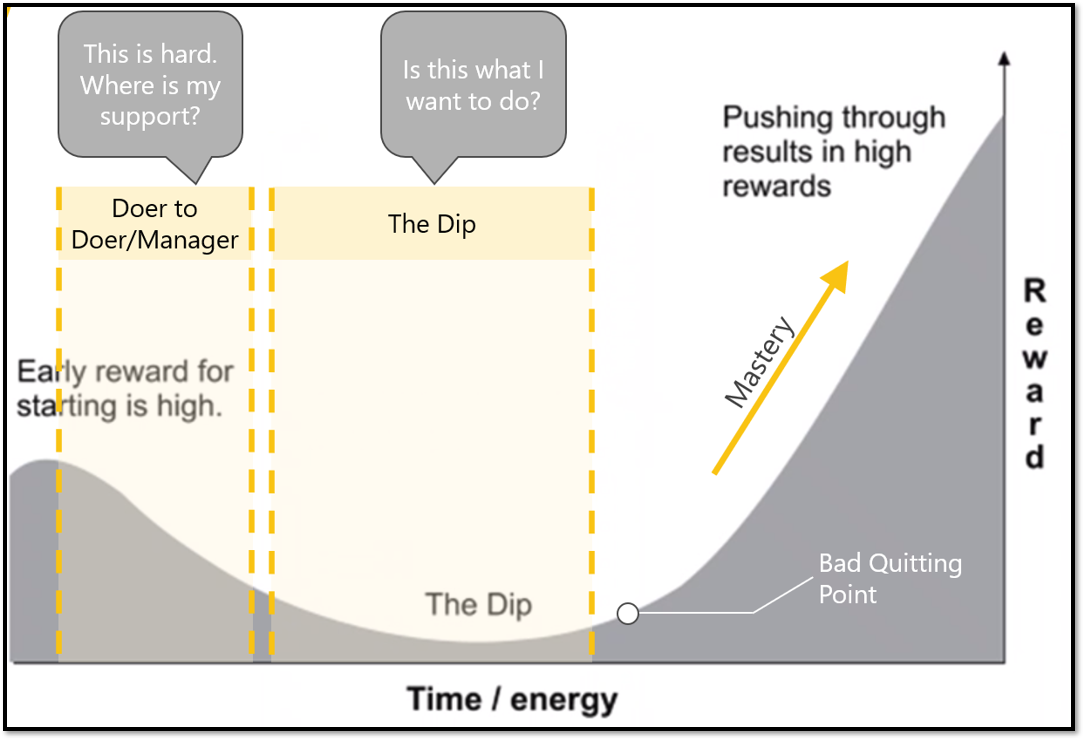
Sourced from Seth Godin with modifications.
(Read more from Seth Godin about navigating the dip.)
If you’re feeling the challenges associated with being a new project manager and wondering if it’s something you’re cut out to do, you just might be in the dip. As you can see from this image, the worst place to quit is right there—when you’re on the verge of making huge progress! Pushing through the dip requires drawing on your values, not settling for plateauing, and letting others provide perspective on how far you’ve already come. And it’s a time where external training and resources can be especially valuable—which is why we put on the ATLAS Summit.
Introducing: ATLAS
In November 2023, more than 100 Kittelson team members came together in San Diego, CA around this topic: pushing through the dip and receiving training, resources, and advice to become more effective project managers. The ATLAS Summit is one part of our staff development program, tailored toward new and emerging managers and leaders—those who are responsible for managing more than just their own work, leading tasks, and managing elements of projects and client relationships.
ATLAS was a valuable experience that not only brought peers together to discuss and solve common project management challenges together, but also provided a cross-regional collaboration and camaraderie that is not easily taught in a virtual setting. While this summit was an internal event, there are many takeaways that are valuable to anyone who is transitioning into a project management role.

Making the Transition
Successful project management requires communication, technical skills and training, time to generate deliverables, and time for review. But it’s also about more than achieving results, schedule, and budget: it’s about the experience of your team, too. Successful project managers satisfy clients while taking care of their people.
In the opening session of ATLAS, Ryan Cunningham emphasized that self-leadership precedes leadership of others. Self-discipline and self-clarity are both needed to effectively serve the people around you. Ryan encouraged attendees to consider the distinction between management and leadership: You don’t manage people, you manage resources. You lead people. And sometimes, being an effective leader is different from being efficient.
"I think the most impactful [thing I learned] is “the dip” because I was experiencing it this past summer not realizing it was a thing and felt lost/crazy/like I'm not cut out for this. But knowing that everyone goes through it at one point or another was comforting and encouraging to keep pushing."
- Miranda Barrus

Maximize Impact, Minimize Stress
What do you think about when you think about time management? Maybe frantically writing lists of everything that needs to be done, setting up calendar reminders, hoping you don’t miss a deadline? Time prioritization and task delegation are two things many people in the working world struggle with. Below were some of the best practices offered in a session about communication, tools and strategies, prioritization, delegation, and non-project time.
- Communicate proactively. Have a plan, anticipate future circumstances and problems, and look at the big picture to hopefully avoid negative outcomes.
- Lean on available resources and tools (such as Microsoft Outlook, OneNote, and To-Do) to help you stay organized, and don’t be afraid to ask for advice or guidance from the project teams, mentors and coaches, and subject matter experts around you.
- Use a time prioritization matrix, schedule purposeful meetings, block your time, and know when to say no. It’s okay to set boundaries, and map out your time to help you stay on track. If no you need to say no (especially to tasks that are not within your capacity, expertise, or goals), consider alternative solutions you can offer.
- Delegate. Identify tasks that can be given to others to free up your time for more important tasks. Be sure to clearly outline needs, tasks, and expected timelines, set checkpoints and deadlines, and be available to answer questions.
- Factor non-work activities into your time management strategies. To achieve your priorities while keeping a healthy and sustainable balance, the things that are important to you outside of work need space on your calendar, too. Consider what you’re passionate about (both inside and outside of work) and what your personal and professional must-haves are, and block those in first.
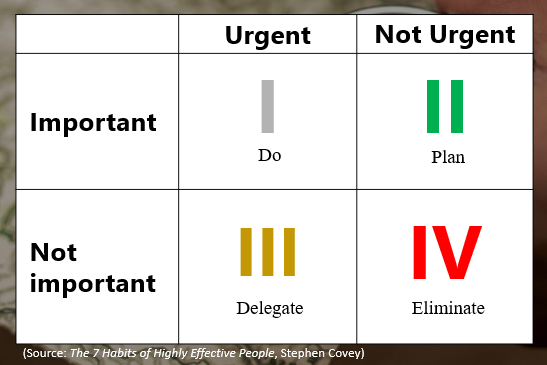
Building Your Team
Operations keeps the lights on, strategy provides light at the end of the tunnel, but project management is the train engine that moves an organization forward. Part of being successful in a project manager role is building and leading a team that is cohesive, communicative, and motivated.
Here are four questions to ask yourself as a project manager as it relates to interacting with your project team.
1) What do you want your team to see? Articulate how your team’s role fits into the bigger picture.
2) What do you want your team to know? Inform your team of the project context, challenges, and the practical details of what your team can expect as you work through the project together.
3) What do you want your team to feel? Consider what kind of experience you want your team to have on your project.
4) What do you want your team to do? Be clear about the responsibilities and expectations for the project.
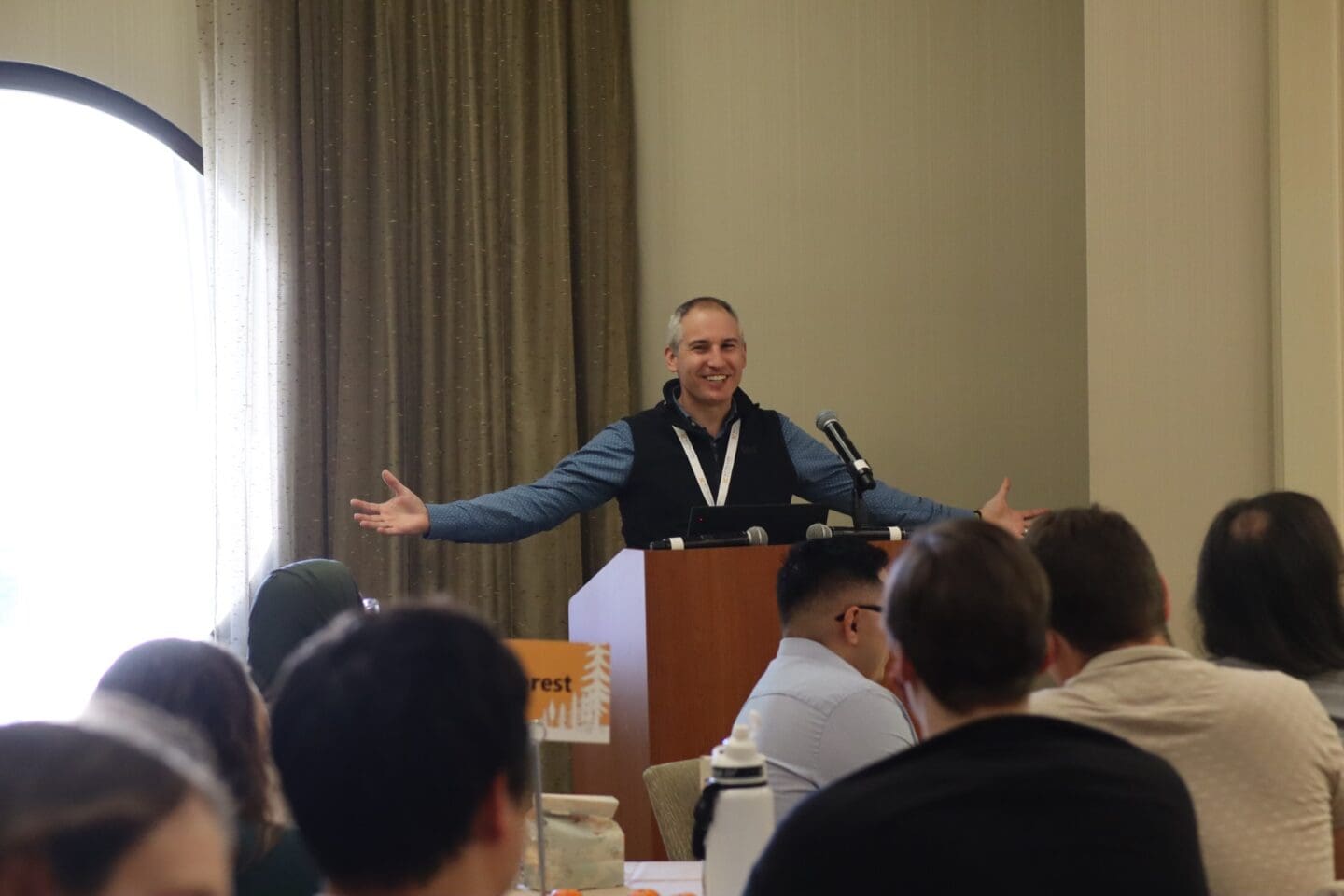
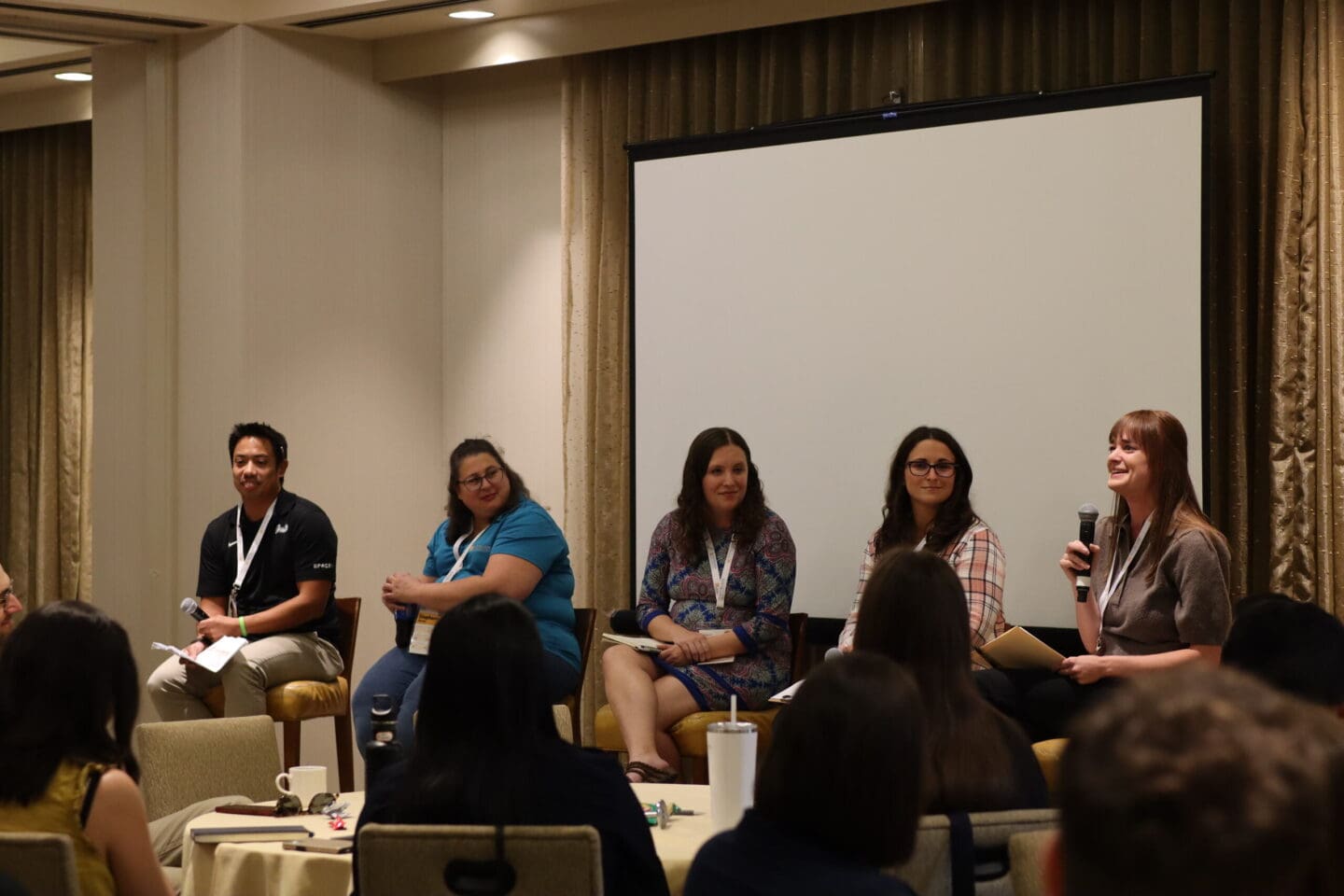
Becoming a Trusted Advisor
Being a trusted advisor is a role, not a position. And trust is not built overnight. It’s nurtured through consistent reliability, genuine effort, understanding, authenticity, and honesty.
ATLAS presenters highlighted principles from Stephen M. R. Covey’s The Speed of Trust as well as experiences and examples from their own work to paint a picture of becoming a trust advisor to both clients and coworkers:
1) Start by trusting yourself and acting with integrity.
2) Take ownership. Look beyond your role to consider how you can benefit the overall effort.
3) Focus on what is best for the project or client, not what we have to gain. For example, providing a resource to a client that didn’t come from us, or supporting a team member to pursue another opportunity if it’s best for their career growth.
4) Be honest and clear, even when you’re delivering news a client does not want to hear. A trusted advisor can be relied on to tell the truth.
"It’s important to remember that we’re not doing this alone. ATLAS was a great opportunity to connect and learn from peers going through similar challenges. I also found it valuable to build connections with seasoned staff who have pushed through their own dips."
- Andrew Thompson
The journey to project management may feel daunting when you’re setting out, but you’ll grow your skills and confidence one task, conversation, and project at a time—and you’re not meant to do it alone! At Kittelson, we build several layers of support into project teams through providing every project manager with a project principal and a quality manager to help them work through challenges and deliver successful projects.
The final session of ATLAS was an “Ask Me Anything” panel in which attendees had an open and honest conversation with five Kittelson team members a few years further along in their careers. Panelists shared challenges and successes, lessons learned around mental health and finding sustainable working rhythms, and emphasized how everyone’s journey is different. A prominent piece of advice from that session was to never go it alone. Reach out to the people around you—your peers, as well as people who are further along in their career journeys—for support, guidance, and a listening ear.
A project manager is an integral role of a project team, but it’s always a team effort to get a project across the finish line. You’ll push through the dip when you lean on your team for advice, encouragement, and support.
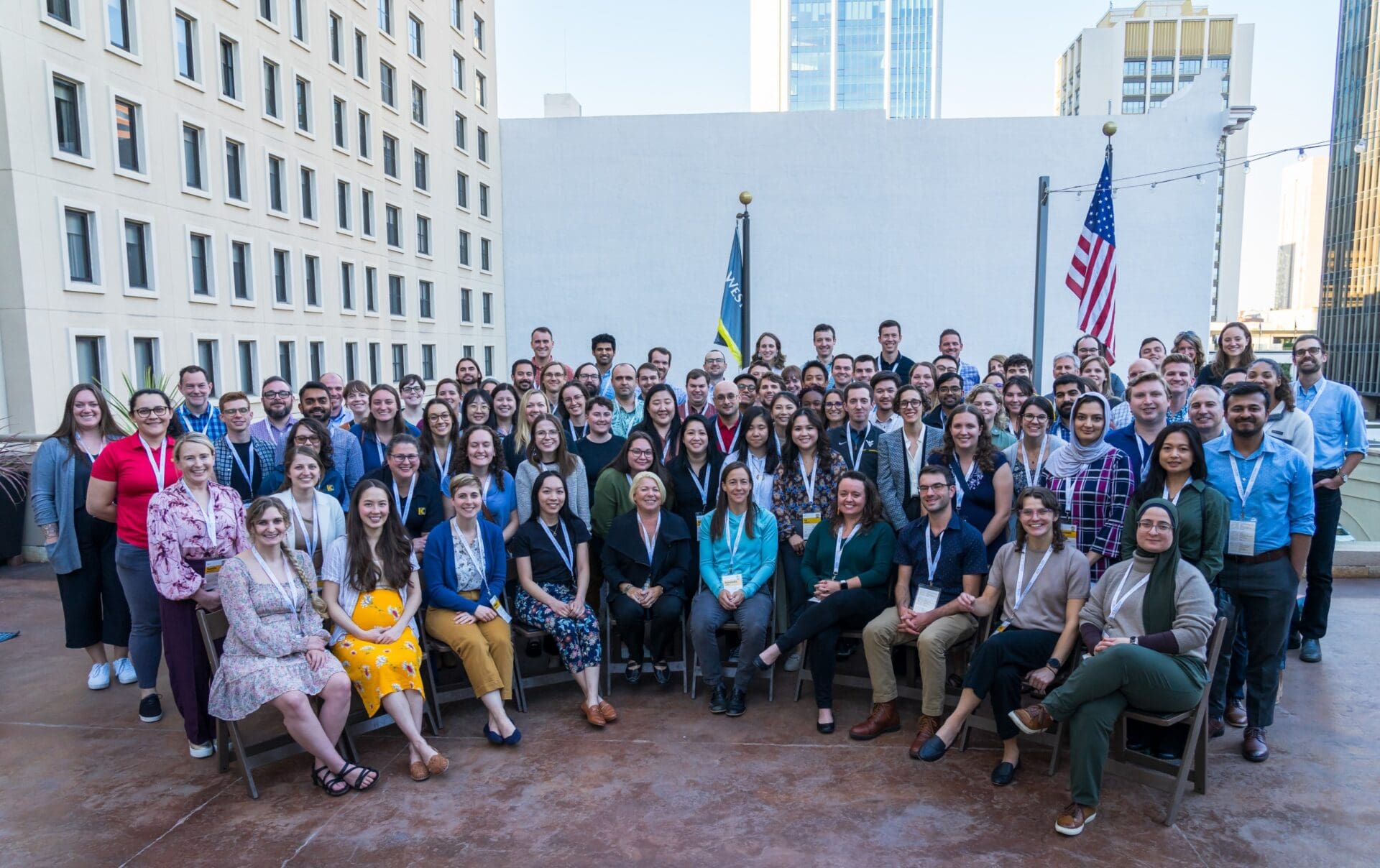
Kittelson’s Approach to Staff Development
At Kittelson, we’re defined by our people. Our growth philosophy is to find passionate and motivated team members and give them space to pursue their interests. To balance our autonomous, trust-based way of operating, we seek to provide meaningful guidance and opportunities to help staff gain leadership skills and grow in their careers. The ATLAS Summit is the second part of a career-long leadership development program that Kittelson offers to provide support at every phase of our team members’ career journeys.
These internal leadership development summits are designed to complement other aspects of staff development, such as individual coaching and mentoring and “The ROAD Ahead,” our year-round professional development process that gives all team members consistent touchpoints with leaders to set goals and connect on feedback.
